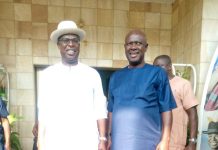By Francis Onyeukwu, News Agency of Nigeria (NAN)
How to strengthen the democratic ideals at the grassroots has been one of the major challenges of Nigeria’s civil rule since Independence in 1960.
The lacklustre state of Local Government Councils before the hijack of government by the military junta six years into independence and after the return of democracy in 1999 is evident.
It was during the Alhaji Shehu Shagari’s administration that Nigerians first witnessed the balkanization of the LGAs by state governors.
This act which impeded the growth of democracy at grassroots, resonated in the first tenure of Chief Olusegun Obasanjo administration when then Ebonyi governor, Dr Sam Egwu brought ‘Development Centre” into Nigeria’s political lexicon.
The development centres in Ebonyi were sub-units created out of the 13 constitutionally recognised Local Government Areas in the state.
Egwu’s intention was later copied by other states which resulted to the infestation of the third tier across the country.
The tinkering with the system through amendment by various State Houses of Assembly adversely affected the development of democracy at the grassroots.
Political analysts blame the mirage of challenges facing Nigeria’s democracy on the unstable state of civil rule at the grassroots.
So of the challenges are rising crime wave, food insufficiency, weak operations of public primary and secondary schools, low revenue generation, unemployment as well as rise in rural/urban migration.
President Bola Tinubu, through Mr Lateef Fagbemi, SAN the Attorney-General of the Federation and Minister of Justice, in May 2024 filed a suit at the Supreme Court against the state governments and seeking financial autonomy local governments.
The apex court however, delivered its verdict in the suit on July 11, affirming financial autonomy of all Nigeria’s 774 LGAs.
It condemned the hijack of allocations due the LGAs and arbitrary dissolution of elected local government councils by state governors.
The Federal Government deferred the effective date of the July 11 Supreme Court verdict by three months in order not to strife the activities of various councils.
The window is expected to enable the states without democratically elected officials to organise elections.
The Supreme Court ruled that states where non-elected council officials are in-charge, the federal would withhold their shares of allocations from the federal account.
Most Nigerians applauded the bold effort to reboot LGAs even as some expressed fears that until Independent National Electoral Commission (INEC) begins to organise council elections, the governors would still manipulate the system.
One of the proponents of this view is an NGO, Woman and Family Advancement Initiative (WAFAI).
It praised the federal government for the financial autonomy, but expressed reservations over the continued conduct of the elections by the State Independent Electoral Commissions.
The Director, WAFAI, Anambra Chapter, Mr PaulChuks Umenduka, suggested that the federal should amend the Act establishing INEC, to enable it take over the conduct of local government elections.
Umenduka’s argument, shared by many political pundits, was that for the elections to be flawless, an independent umpire must take charge. This is will not be the case when state governments are judges in their own case.
A look at the results of local government so far conducted after the July judgement shows that in Anambra, the ruling All Progressives Grand Alliance (APGA), won all 21 chairmanship and 326 councillorship positions contested for on Sept. 28.
Same feat was repeated in Imo and other states by the respective ruling parties.
Mrs Genevieve Osakwe, Chairman, Anambra State Independent Electoral Commission (ANSIEC) who announced the results in Awka claimed the results were credible.
In Imo, the ruling All Progressives Congress (APC), equally won in all the 305 councillorship and 27 chairmanship positions , according Mr Charles Ejiogu, Chairman Imo State Independent Electoral Commission (ISIEC).
The same winner takes it all also took place in Enugu being controlled by the Peoples Democratic Party (PDP). It won all the 17 chairmanship positions and 260 councillorship seats.
Prof. Christian Ngwu, the Chairman of Enugu State Independent Electoral Commission (ENSIEC), equally tagged the exercise very credible.
Also in Kwara State, the ruling APC won all the 193 councillorship seats and 16 chairmanship positions, according to Mr Muhammad Okanla-Baba, the chairman of the state electoral commission who claimed the exercise was without manipulations.
In Rivers State, Action Peoples Party (APP), stunned Nigerians by producing 22 out of 23 chairmanship positions in the state, a few weeks after the contestants who hitherto were on the platform of PDP defected to APP.
Justice Adolphus Enebeli, chairman of the electoral commission said, the chairmanship position for Etche Local Government Area was only won by the Action Alliance while 319 councillorship positions went to APP.
Mr Jude Ihiaka, Abuja-based political scientist, observed that what played out in the name of local government elections in parts of the country recently was a dangerous development.
According to him, it is capable of rubbishing the gains already made in not only the LGAs, but entire democratic system in the country.
“In my thinking, the governors sat back after the Supreme Court judgement on financial autonomy on the local government and came up with another style to arm- twist the system.
“With the manner of `the winner take it all elections’, it shows that the governors are not yet tired with the game they playing with the council administration,’’ he said.
Ihiaka, however, called on the National Assembly to expedite action on the amendment of 1999 Constitution to addressing ambiguous areas such as the Act establishing the Independent National Electoral Commission (INEC).
This, he said, would allow the commission to equally conduct the LG elections.
Umenduka, said it was unfortunate that after the controversial LGA election in Anambra, the State House of Assembly amended the state local government law with the intent to divert part of LG allocation.
“Amendment of the law making provisions for certain percentage of the allocations due the LGAs to be paid into a joint account clearly negates the recent Supreme Court judgment.
“Eventually, other states will copy Anambra model if the federal government allows this moves.
“It will rubbish the financial autonomy for which Nigerians are already praising President Bola Tinubu’s administration.
“My advice is that the FG should punish any state trying to circumvent the financial autonomy granted the 774 LGAs,” he said.
The Senate last week expressed concern over the move by some states to circumvent financial autonomy ruling.
The lawmakers’ reactions followed a motion sponsored by Sen. Tony Nwoye (LP-Anambra) and nine other lawmakers at plenary on October 16.
Nwoye had through Orders 41 and 51 of Senate Rules, while presenting the motion, alleged a plan by some state governments to dodge the execution of the Supreme Court judgement on the autonomy of local government financing.
According to Nwoye, the State Houses of Assembly were attempting to enact alternative laws for their respective states.
He specifically alleged that some state governors were already using their House of Assembly to enact laws that would mandate local government councils in their states to remit funds into State /Local Government Joint Account rules.
But Senate President, Godswill Akpabio, drew the attention of lawmakers to section 162 sub-sections 6 of the 1999 Constitution as amended.
Akpabio, who read copiously the section, said it created the State-Local Government Joint Account.
“I think what we need to do is to carry out required amendments of certain provisions of the constitution as far as local governments autonomy is concerned”, he added.
Dr Wale Sadeeq, an Abuja-based political scientist and media practitioner maintained that it was good for the local government councils to be autonomous.
He, however, said while the federal government was making efforts to strengthen democracy at the grassroots because of numerous advantages, there should be laws that would enable the states to regulate the activities of the third tier.
“If local governments are allowed unfiltered access, a lot will go wrong and the laws must be there for the states to regulate the activities of the council areas,” he said.
The argument canvassed by Sadeeq tallies with Akpabio’s view when he reiterated the need for the amendment of some sections of the 1999 Constitution as amended to make the autonomy unambitious.
With the issues that have arisen after the recent Supreme Court judgement and the moves by some states to cash in on lacuna noticed, it is imperative that the National Assembly acts fast to tighten every loose ends.


























